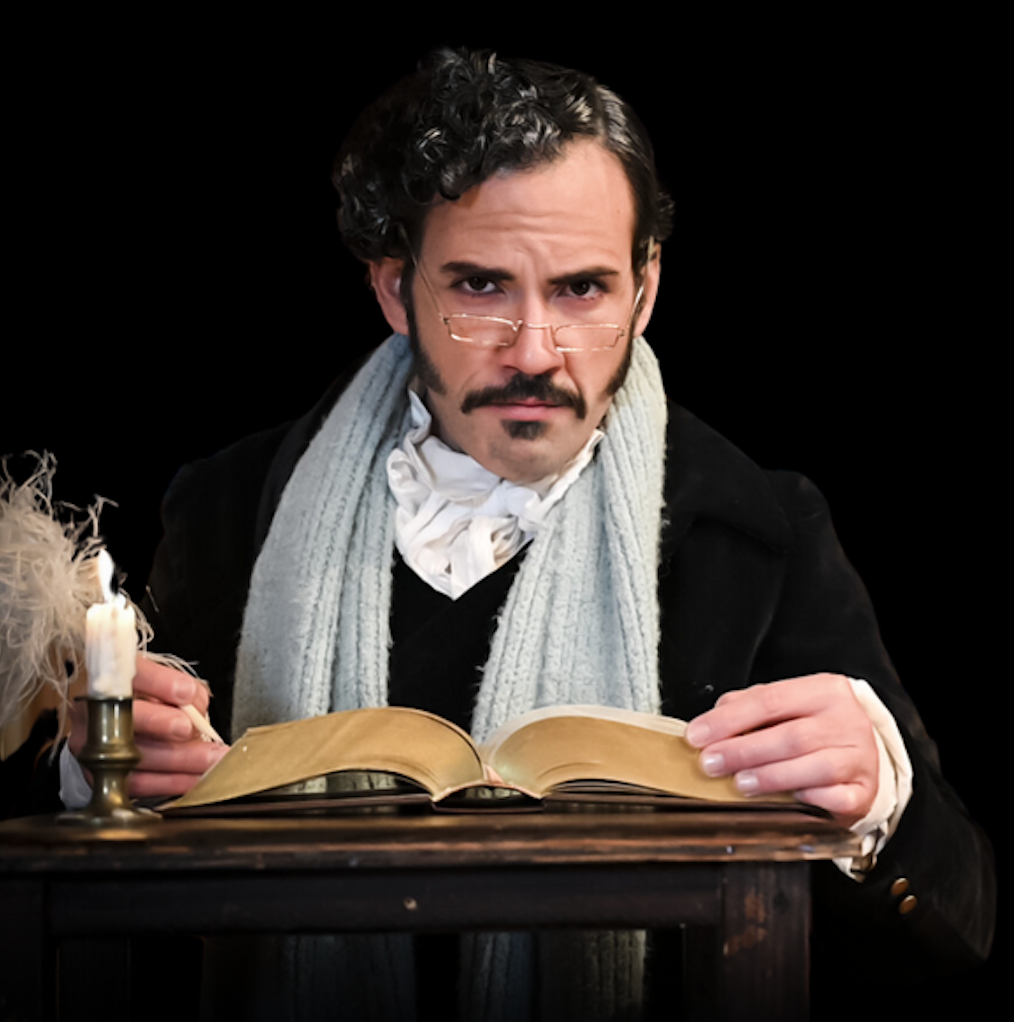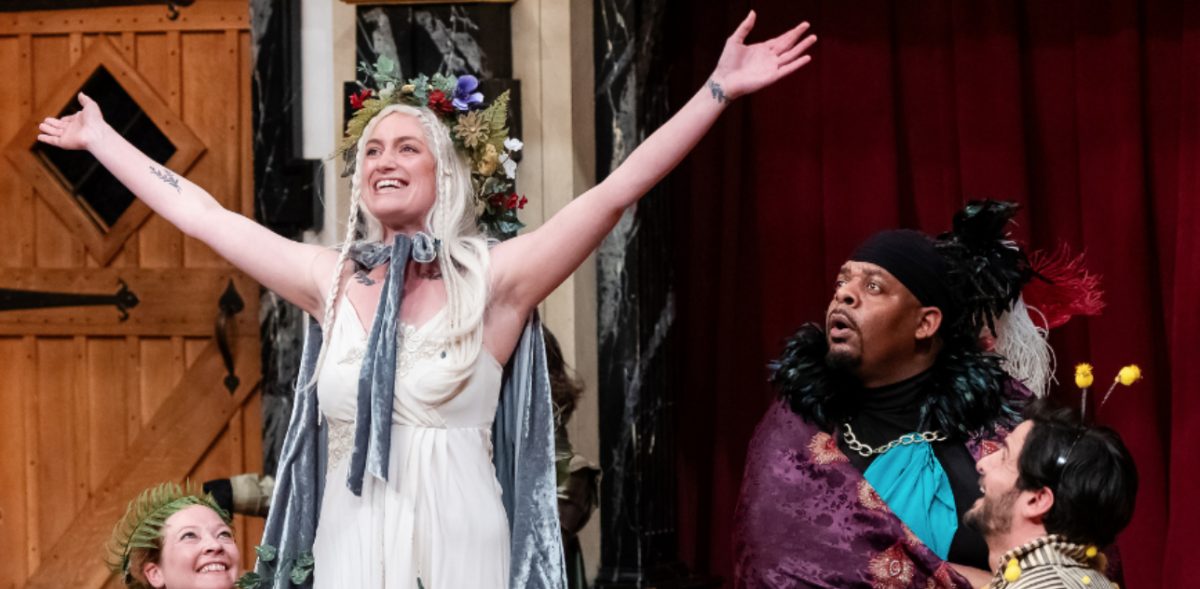“We do it with the lights on,” says The American Shakespeare Center’s Blackfriars Playhouse website about its use of “universal lighting.” So right up front you know that whatever you see in its elegant, woody environs will take place with the house lights aglow.
Understandably, in its staunch attempt to maintain historical accuracy wherever possible, the ASC’s staging conditions reflect the decision to keep the joint looking like what we surmise The Bard of Avon may have presented himself. Admirable.
Watching other Shakespeare and Elizabethan plays at ASC, that decision has never been an issue for me. With its engaging acting and uptempo pace, the company’s current production of Macbeth, directed by José Zayas, works on many fronts. Yet, I feel that it suffers at times because of that unwavering dedication to keep the room well-lit.
And while the Blackfriars of old did it with the lights on, too, the pre-electric powered atmosphere would have been a much dimmer affair. I’m willing to concede that this may be my own hang-up. After all, I hold Macbeth close to my heart as a supernatural bloodbath of a play, more than a political thriller or a treatise on the dark nature of man.
Aside from my personal grievances, it’s a great production. And before we go into my gripes, here’s the gist of the story for anyone who’s forgotten: Three witches tell Macbeth that he’ll be king, and then he and Lady Macbeth murder a bunch of people they’re close with to make that prophecy happen faster. It doesn’t work out, and they both die too.
This production has many positives that have nothing to do with lighting. K.P. Powell does a thoroughly commendable job as the sometimes fierce, sometimes cowering Macbeth, interpreted with an irrepressible warmth. While just about every version of The Scottish Play unwinds a coldly reptilian, and at times weak-willed character, Powell, to my memory, may very well be the only likable Macbeth ever created. He’s almost too charming—and occasionally quite funny—but if we’re to believe that the role he’s assumed convinces those around him of his goodness as he slashes his way up the political ladder, the charismatic portrayal checks out.
Nervous laughter elicited from the crowd at odd times is surely the result of Powell’s continued eye contact with audience members under such illuminated conditions. No doubt they were often laughing a bit more than the script—or Powell for that matter—was pulling for.
Alongside Powell, Kenn Hopkins, Jr. as Macbeth’s ill-fated bestie Banquo, is a mountain of a man with a booming voice that positively fills every corner of the theater with a strength demanding attention. Also excellent, Angela Iannone embodies a commanding King Duncan, summarily slain offstage in Act Two.
Though there’s clearly a challenge in tasking a troupe of eight with performing no less than 16 characters, it felt like the main looming hindrance—lights—threatened the overall success of this interpretation. For me, the three “weird sisters” have an appropriately otherworldly quality elevated by a trio of grotesque, mascot-like, oversized heads and gauzy flowing shrouds. When they emerge at the start of the play to predict Macbeth’s future, they could be frightful and monstrous. They should be. Yet they are too plainly out in the open, undermining the ability to persuade us we’ve settled into the hazy Scottish moors in the thick of a thunderstorm.
The lack of obscurity works against the action indicated in the text later on as well. Deep in the “thick night” and “blanket of the dark,” Lady Macbeth mentions when she and her husband carry out their regicide, it’s just more difficult to buy. An audience always requires a healthy suspension of disbelief, but it was asking too much of Leah Gabriel (Lady Macbeth); a proposition made even more difficult when she’s wandering about insanely whispering over her part in the king’s murder in the final act.
During the play’s culminating scenes of war, the light strikes again. Tragic hero Macduff avenges his slaughtered family and rights the wrongs against the royals by killing and beheading Macbeth—yet spirited, compelling Aidan O’Reilly is undermined by the visual clarity of the action. The fight scenes would work well in a more strategic staging, but as O’Reilly and Powell grapple and stab at one another, the brightness of the room casts their struggle as mere pantomime unbefitting such fine acting.
One saving grace of staying historically accurate comes in the incorporation of persistent musical elements, albeit with a 21st-century vibe. The unexpected use of the bass line of TV on the Radio’s “Wolf Like Me” (incorrectly credited to a cover version by Lera Lynn) helps build tension. Same goes for other dramatic moments heightened with a cacophonous soundtrack made off-stage with a din of drums and crash of cymbals.
To be fair, I’m not suggesting that the ASC needs to install spotlights and dry ice machines at Blackfriars. Only that perhaps more serious consideration be given to uphold the darker interests of a sinister, spooky play. Yet if you always imagined Macbeth, at its core, as a backstabbing title tussle or a psychological thriller about the power of suggestion, you’ll love this even if you have to wear sunglasses.









